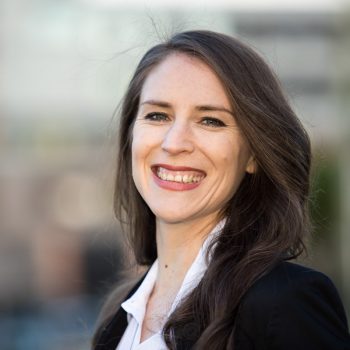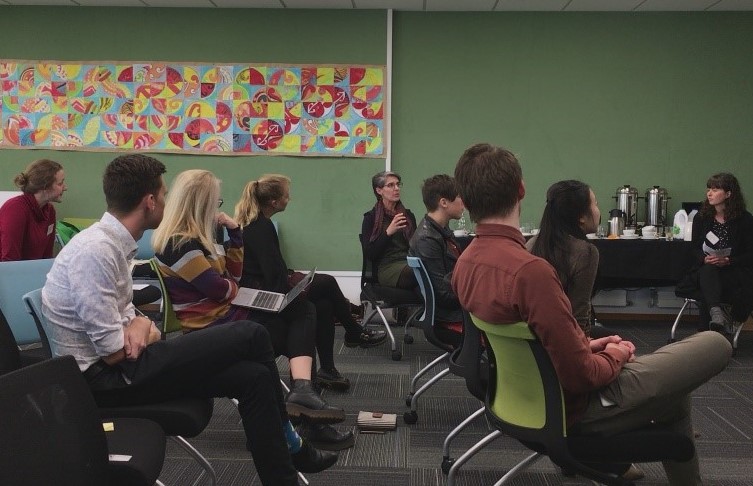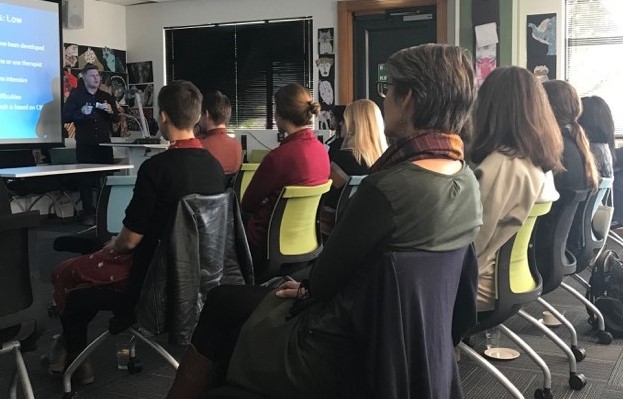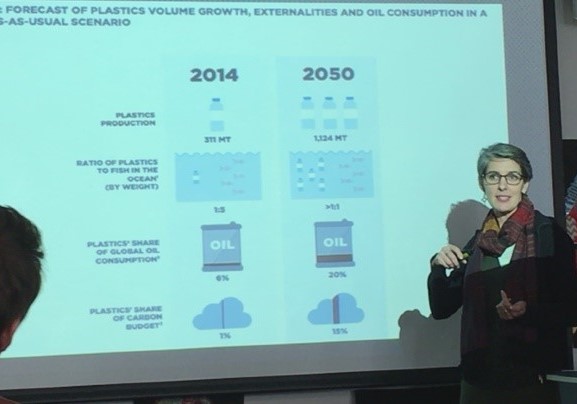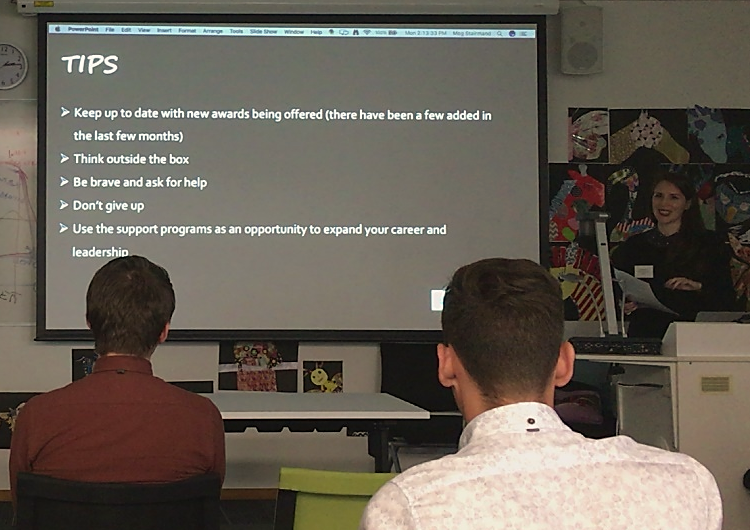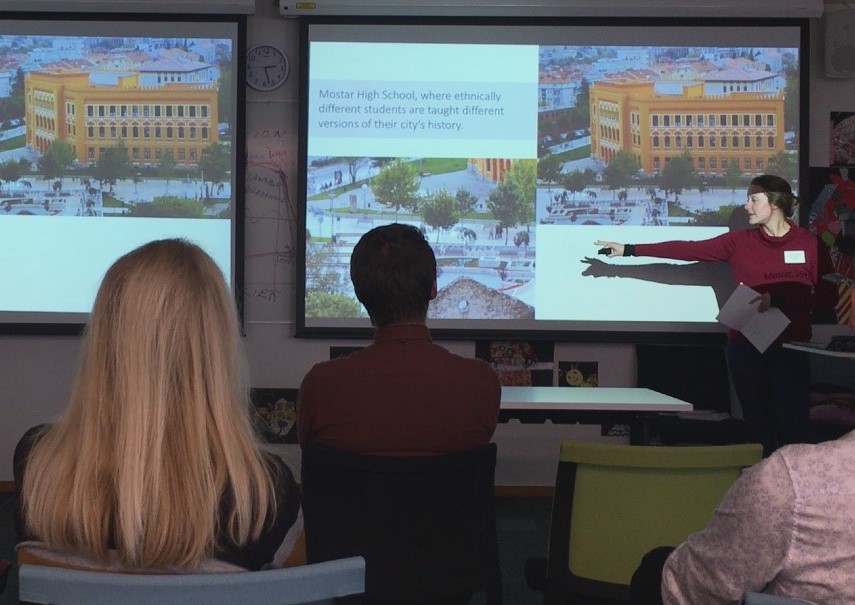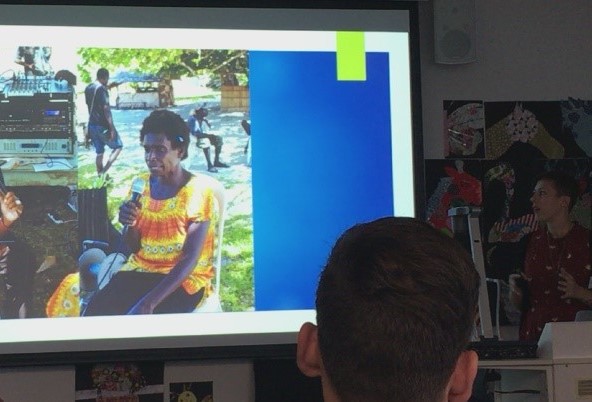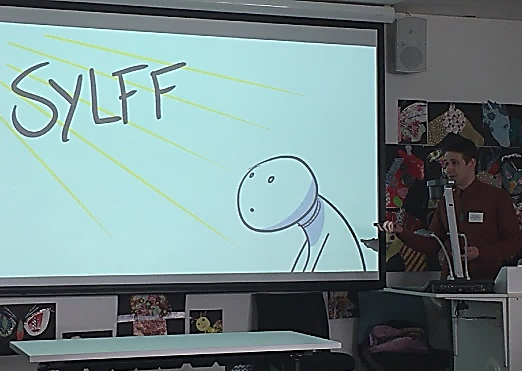Voices from the Sylff Community
Dec 17, 2018
The 2018 Inaugural Sylff Fellows Networking Event in Auckland, New Zealand
Sylff's second Local Association Networking Support (LANS) event was held at the Auckland Campus of Massey University in September 2018. In New Zealand, Sylff fellowships are provided to students studying at one of the eight public universities in the country, and Massey University is responsible for program administration. The universities are scattered across the main two islands of the country, and there is rarely an opportunity for Sylff fellows to have face-to-face conversations with one another. The networking event was realized with the efforts of five organizing Sylff fellows. A number of research presentations were given to introduce fellows’ activities during the event. The participating fellows enjoyed networking beyond the bounds of institutions and fellowship years. The LANS award supported two international travels and five long-distance travels within the country of participating fellows. The secretariat hopes that this initiative will be continued as an annual event.
The following article is a report of the event by Tess Bartlett, one of the organizers.
***
On September 3, 2018, New Zealand Sylff fellows came together for the inaugural Sylff Fellows Networking Event. This article provides a summary of the event and of the workshops and presentations outlining the exciting work that a number of New Zealand Sylff fellows are doing.
The formal introduction was given by Ms. Yue Zhang from the Sylff Association Secretariat, a program officer for leadership development at the Tokyo Foundation for Policy Research. Ms. Zhang outlined some of the opportunities for Sylff fellows afforded by the recently established Sylff Association (founded in 2017) as a way to continue supporting current and former Sylff fellows through a range of programs in the areas of research, social action, and networking.
We learned from Ms. Zhang that there are now 69 Sylff institutions (with 16,000 fellows and 44 countries represented). The participants at the New Zealand inaugural Sylff event were among those selected as Sylff fellows across the years because of their outstanding academic success and because they were considered future leaders in various fields.
The event concluded with a discussion, in which we reflected on the successes of the day (e.g., making connections, realizing the value of interdisciplinary research and networking, and celebrating current and past research). The attendees also expressed unanimous support for regular networking events of a similar nature. An event next year may be held via an online conference system and may include a focus on some of the following: social science, interdisciplinary research, research in New Zealand, and how we can be leaders specifically in New Zealand. One of the fellows present raised the possibility of New Zealand (and perhaps Pacific) Sylff fellows collaborating on a Sylff Project Grant application, the goal of which would be to empower Pacific Island youth to be change-makers, leaders, and advocates and to take active roles in responding to specific challenges facing their communities.
Summary of Workshops and Presentations
Workshop: How to Take the Big Leap and Step into Your Power, Ms. Tess Bartlett
The first workshop was run by Tess Bartlett, the founder and director of This Simple Space, where she is a Creative Mastery Coaching and Research Consultant. This workshop explored some of the blocks that we might have holding us back from taking the big leap, such as fears and self-doubt. It also explored how to deal with procrastination, how to recognize fear and self-doubt, and how to set simple goals. After learning these tools, we had simple actions for moving forward so that we can thrive.
Low-Intensity CBT for Community-Dwelling Older Adults Experiencing Low Mood, Dr. James Martyn
James presented on his research based on cognitive behavioral therapy (CBT) and how early experiences have an influence on yourself, others, and the future. CBT can be extremely helpful for everyone, and the skills can be kept for a lifetime.
There are a number of barriers that prevent people from getting treatment for depression, such as low motivation, stigma, going to a general practitioner, lack of funding or resources, exclusion based on minimum symptom severity, social stigma associated with mental disorders, lack of specialist-trained health-care providers to conduct treatment, inaccurate diagnosis (particularly with older adults), and cost of private treatment. Many people therefore do not access treatment.
Low-Intensity CBT (LI-CBT) Self Help provides evidence-based CBT treatment content via nonconventional means, such as books, audio, and the Internet. Provision of guidance in LI-CBT self-help significantly improves treatment outcomes. In this sense the individual becomes their own treatment option, which means that there might be greater access or speed to treatment, service flexibility, responsiveness, capacity, and patient choice, and may overcome barriers around delivery.
There is a dearth of guided CBT self-help options for depression in New Zealand. James’ study looked at a group version of self-help, which is a cost-effective and time-effective low intensity treatment. The self-help material is based on CBT principles and is an eight-week course that aims to look at ratings of depression, anxiety, and quality of life and to investigate whether there was engagement with the LI-CBT self-help among individuals between the ages of 60 and 75. Evidence supports that Living Life to the Full (LLTTF) is a viable and effective LI-CBT option for improving symptoms of depression and anxiety and quality of life among older adults aged 60–75 years dwelling in the New Zealand community.
Creative Solutions for the Global Plastics Crisis, Dr. Trisia Farrelly
For six years Trisia has been on a social experiment to learn about toxic plastics and consumer behaviors. Despite her environmental ethics, Trisia found it very difficult to avoid plastic and so wondered what this would be like for people who are not as aware or do not have the money to avoid plastics.
There is nowhere on earth that has not been touched by plastic: bees are using it to create hives, it has been found in beer, it is in our air, and it is in the water ecology. Most of it comes from land sources. Macroplastics break down into microplastics, which can be consumed by fish and can then be broken down into (nano)plastics that can pass through cell walls and cell membranes. One major concern now is microfibers found on clothes; because of their shape they get stuck inside fish.
Even if we were to recycle twice as much as we are currently recycling (which would only be 30%), the oil used would negate any of the recycling that we do. Instead, we need to aim to replace the use of, and prevent the unnecessary production of, any single-use plastics. Trisia informed us that 91% of plastics are not recycled and that we need to work on another level. The focus is often on recycling plastic rather than on preventing it from being created in the first place; this focus needs to change. Supply of plastics has increased 20-fold in the last 60 years, and the forecast of plastics volume growth suggests that there will be more plastics than fish in the ocean by weight in 2050.
Plastics don’t go away, you just find them in a different form somewhere else.
The outlook is looking good in terms of going plastic-bag free: New Zealand, for example, is going plastic-bag free in 2019. There is a lot of research into the effect of plastic on the environment and on our health. China has recently shut down its gates for post-consumer recyclables and plastics. But there is still more work to be done. Preproduction design and reduction and prevention include things like nonedible wastes (e.g., corn husks and coconut shells), but these measures will not be sufficient to meet the level of the current crisis.
Instead, it comes down to prevention, such as individual consumer responsibility. And yet this individualizes the problem rather than looking at the companies creating the plastics. Individual and community roles also play a part in cleaning up beaches. The aim is to work toward reducing the amount of materials that enter the “circular economy.” It also is about acting powerfully in response to the plastics crisis, such as making manufacturers responsible for what they produce and develop policies that are precautionary. There need to be loud voices pushing for this from the ground up. One way of doing this is to lead by example. This involves a new plastic pollution strategy that involves plastic-free-campuses, organizations, shops, cities. Another final solution is to have an international legally binding plastic pollution treaty based on the Montreal Protocol.
Overlooked and Unsupported: A Study of Imprisoned Primary Carer Fathers in Victoria, Australia, Ms. Tess Bartlett
Tess spoke about primary carer fathers in prison in Victoria. It is well established that the vast majority of prisoners are men and that around 50% of these men are parents. Yet very little attention is paid to the parenting status of this group. As such, there remains a gap in research, theory, and practice with regard to primary carer fathers in prison. Tess provided an overview of her PhD thesis examining the experiences of imprisoned primary carer fathers in Victoria, Australia, at the point of arrest and imprisonment. The views of 39 primary carer fathers incarcerated in Victoria were analyzed and reported on. Tess presented findings from her research, clearly highlighting how fathers are overlooked and unsupported with regard to their children at the key points of arrest and imprisonment, serving as a barrier to maintaining father-child relationships. She also offered pragmatic solutions as to how to best facilitate the connection between incarcerated fathers and their children.
In 2017 Tess received a Sylff Research Abroad grant, which allowed her to travel to the United States to speak with experts in research and program design directly related to prisoners and their families. She is currently the only person conducting research that examines fathers who were direct carers of their children prior to imprisonment; traveling to the United States provided an international context to her dissertation. Tess drew on her experience utilizing Sylff alumni awards to offer advice to Sylff recipients about career advancement and leadership.
Olive Trees and Heroines: Talking Peace—Young Women’s Agency and Peacemaking in the Israeli-Palestinian Conflict, Ms. Sophie Goulter
Sophie spent time in Bosnia while traveling in 2012. She learned that at Moster High School students were taught different versions of their city’s history depending on their ethnicity.
Youth engaging in collaborative peacemaking face increasing obstacles to demonstrate their agency. Through critical feminist and phenomenological analyses Sophie examined the agency of youth in Creativity for Peace (CfP) by investigating their capacity to act for peace.
Sophie described a camp in Santa Fe, New Mexico, where Palestinian and Israeli teenage girls live in a camp house. The aim is to cooperate and to live harmoniously together, sharing resources. Over the first several days they talk about their needs and use “deep listening” and “compassionate listening” as a way to develop empathy and build a peaceful relationship with one another. Authentic effective speaking is also used to produce quality and cooperation between participants.
Agency was a key component. This is the consciousness of one’s potential to take action, a willingness to engage in collective action in the interest of the group, and the knowledge and willingness to challenge existing structures. Thus, agency is having the knowledge, power, and ability to activate resources (White and Why, 1998). The ability for youth to have agency is important in activism and conflict.
Some of the dominant challenges to participation in peacemaking are structural: the societal stigma toward peacemaking, the internal conflict that the young women experience, and the emotional commitment required to sustain their engagement. The means by which the girls navigate these challenges come back to practicing the nonviolent communication that they learned with CfP, as well as creating and sustaining supportive networks.
Sophie provided insight into how to navigate and demonstrate agency. The first was communication: “talking with a sweet heart” and allowing people to share in an authentic way, as well as telling personal stories and using “like terms” or comparisons. Personal relationships and support were also important: community, friends, and networks, and CfP as a coping mechanism. There was an added complexity as to how they thought of themselves. For example, they wanted to see themselves simply as teenagers, separate from the conflict.
Lastly, Sophie talked about some reflections on the research process and discussed how life-changing it was to undertake her Masters and be involved in day-to-day interviewing, becoming quite involved in the conflict in the process.
The Meri Shall Inherit the Earth: Women’s Leadership in the Autonomous Region of Bougainville, Ms. Kayt Bronnimann
Kayt spent close to a year volunteering in Bougainville and has been questioning “development” and what this is. Bougainville has fallen under Papua New Guinean rule and follows a matrilineal system. One woman said, “Basically, we were cut off from the rest of the world” (Josephine Sirivi).
In 1996 the Community Government Act was passed, under which a man and a woman must be selected to represent each ward. While this does open up the doors for women, there is still a predominantly male-led leadership. Kayt’s research examines the gendered impacts of the new Community Government Act on political participation and social transformation.
A referendum will take place in 2019. Kayt worked with the Bureau of Public Affairs, which will work to spread the word about the referendum in the community.
Kayt found that people are very hungry for information and that a lot of people are in the dark. Many villages are not connected by electricity and many do not have television or access to news. The conflict has touched all people living in Bougainville. Women interviewed by Kayt were involved in the fight for peace and emerged as leaders. One woman had to deal with the death of her daughter but knew she had to move forward in order to serve her people. Strength through diversity and strength through faith were a common story for women interviewed.
Another woman in a high-status position helped many women whose husbands had abandoned or beaten them, while hiding the fact that she was also a victim of violence at the hands of her husband.
The women found themselves at the intersection of culture. They were in remote communities, with few resources, and in traditional gender roles where they are often tied to motherhood. When women stand for political office, this often means that they have to do it without their husband’s approval or support.
As an alternative to the increasingly controversial “voluntourism,” Kayt suggested “Volunteer Services Abroad”— a volunteer program that gives people the opportunity to go to another country and develop skills. Yet this is not often available to people in those communities in the same way. She posed the question, “Why do we need to leave in order to discover our own privilege?”
“Years of research have frequently failed to improve the conditions of the people who are researched.” —Tuhiwai Smith (2012)
Human Design for Humans, Mr. Scott Brebner
Scott spoke about how he makes technologies that help improve people’s lives. As a designer he is interested in storytelling. At the age of seven he became fascinated with games, writing his own Dungeons and Dragons missions. As a teenager he knew he wanted to go to university and become a game designer. At university he learned about Human Designs for Humans and ethical game design. At one memorable lecture the professor spoke of the Dream Ball Project—about designing a Medikit that turned into a soccer ball. These projects flicked a switch about ethical consciousness, and he decided to make games that help people with rehabilitation. Scott made TodTec, a game used to help children with a drop foot or recovering from ankle injuries to get the exercise that they need for rehabilitation.
There are ways of supporting games and the positive use of games in people’s lives. Scott spoke about presenting his ideas to the Sylff Association and argued that all people can use games. He designed Double 12, a domino game that would translate skills to game play using physical therapy exercises for people who have suffered a stroke, by moving players backwards and forwards on a board. Scott designed the digital aspect, and his team took the project out to volunteers (survivors of a stroke), who gave feedback on how it might help them in the community. Since then, Scott has spoken at several conferences about design sustainability and human ethics.
Scott now works at Exsurgo, designing games for people who have had strokes. He is actively trying to take big machinery and make it affordable and make recovery more transparent for users. By building rehabilitation games he hopes to make the experience more fulfilling. Medical device production is tricky (safety protocols, for example), but Exsurgo aims to meet that challenge head-on to keep the devices relevant.
Acknowledgments
On behalf of the Organizing Committee: The organizers of the inaugural New Zealand Sylff Fellows Networking Event would like to thank the Sylff Association for making this day possible and the Sylff New Zealand Steering Committee for covering the catering costs.
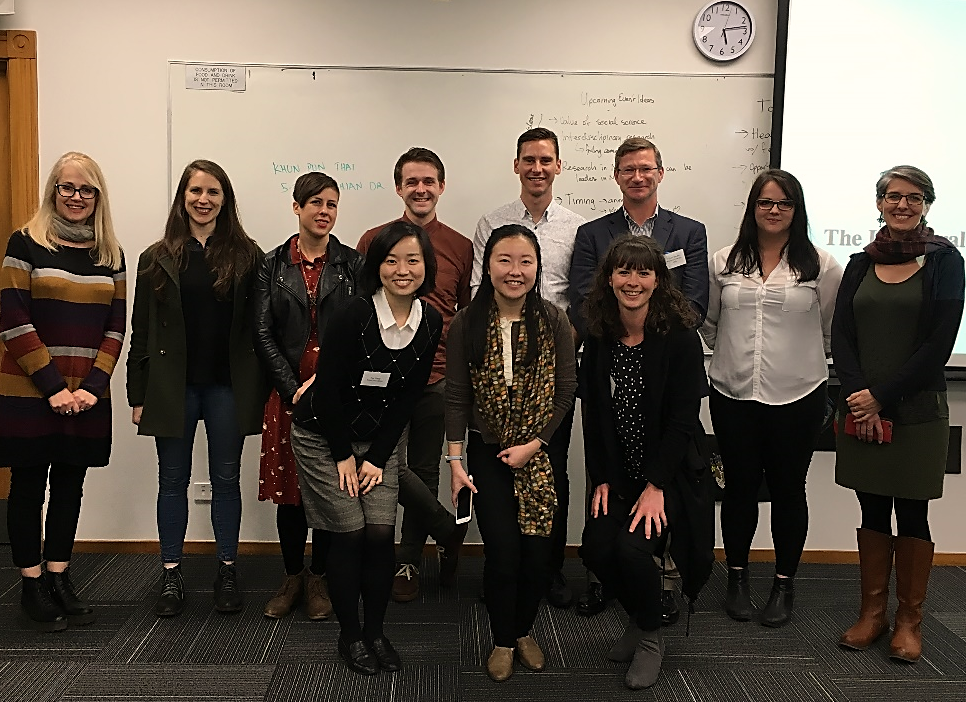
A group photo after the meeting: (front row, left to right) Ms. Yue Zhang, Ms. Amy Liang, Ms. Meg Stairmand, (back row, left to right) Ms. Naomi Collins, Ms. Tess Bartlett, Ms. Kayt Bronnimann, Mr. Scott Brebner, Mr. Robert Haua, Mr. Richard Wanden, Ms. Giulia Lowe, and Dr. Trisia Farrelly.
|
Sylff members present |
Current work |
|
PhD student in forensic psychology, Waikato University |
|
|
Director, Political Ecology Research Centre, and senior lecturer, Massey University |
|
|
PhD candidate, research assistant, and teaching associate in criminology and social work, Monash University |
|
|
Contract editor |
|
|
Probation officer, Department of Corrections |
|
|
PhD student in psychology |
|
|
CEO and president, Hiring Goldmine; government sales director, Tech Mahindra Ltd. |
|
|
Market information administrator, Strategic Pay |
|
|
Game Designer, Exsurgo Rehab |
|
|
PhD candidate in pharmacology and hospital pharmacist, Auckland City Hospital |
|
|
Masters student in development studies, Auckland University |
|
|
Clinical psychologist, mental health services |
|
|
Ministry of Foreign Affairs and Trade |
|
|
Sustainability manager, Air New Zealand |
|
|
Funding specialist, Para Kore Marae |
|
|
Others in attendance Naomi Collins Yue Zhang |
Program officer for leadership development, Tokyo Foundation for Policy Research |
*organizers of the event
